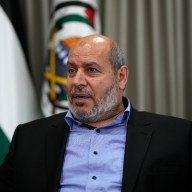SEOUL, South Korea – North Korea reportedly tested two more short-range missiles Tuesday, thumbing its nose at global powers just hours after the United Nations Security Council condemned the regime’s provocative nuclear test.
Pyongyang also warned ships to stay away from waters off its western coast this week, a sign the country may be gearing up for more missile tests, South Korea’s coast guard said.
North Korea appeared to be displaying its might a day after conducting an underground atomic test in the northeast that the UN Security Council condemned as a “clear violation” of a 2006 resolution banning the regime from developing its nuclear program.
France called for new sanctions, while the United States and Japan pushed for strong action against North Korea for testing a bomb that Russian officials said was comparable in power to those that obliterated Hiroshima and Nagasaki during the Second World War.
Russia, once a key backer of North Korea, condemned the test. Moscow’s UN Ambassador Vitaly Churkin, the current Security Council president, said the 15-member council would begin work “quickly” on a new resolution.
But many questioned whether new punishment would have any effect on a country already penalized by numerous sanctions and clearly dismissive of the Security Council’s jurisdiction.
North Korea’s test of a long-range missile in July 2006 and its first nuclear test in October 2006 drew stiff sanctions from the Security Council and orders to refrain from engaging in ballistic missile-related activity and to stop developing its nuclear program.
Ignoring the missile ban, North Korea went ahead and launched a long-range rocket on April 5. The Security Council reacted then with a censure but not sanctions, which North Korea’s traditional allies, Russia and China, opposed.
Even if Russia and China support sanctions for Monday’s test, it’s unclear whether they will rein in the regime’s atomic ambitions.
“I agree that the North Koreans are recalcitrant and very difficult to hold to any agreement that they sign up to,” Britain’s ambassador, John Sawers, told the British Broadcasting Corp. “But there is a limited range of options here.”
Monday’s nuclear test appeared to catch the world by surprise, but South Korea’s spy chief told legislators that Beijing and Washington knew Pyongyang was planning a test some 20-25 minutes before it was carried out, said Choi Kyu-ha, an aide to lawmaker Park Young-sun.
South Korea, meanwhile, announced it would join a maritime web of more than 90 countries that intercept ships suspected of spreading weapons of mass destruction – a move North Korea warned would constitute an act of war.
North Korea’s neighbours and their allies scrambled to galvanize support for a strong, united response to Pyongyang’s nuclear belligerence.
President Barack Obama and South Korea’s Lee Myung-bak “agreed that the test was a reckless violation of international law that compels action in response,” the White House said in a statement after the leaders spoke by telephone.
Obama also spoke with Japanese Prime Minister Taro Aso, the White House said, and the leaders agreed to step up co-ordination with South Korea, China and Russia.
Meanwhile, America’s UN ambassador suggested Tuesday that China’s growing concern about the nuclear test presents the international community with a stronger diplomatic card to play against the Pyongyang regime.
“China has an interest in what transpires for North Korea,” said Susan Rice.
“They share a border. They want to see a North Korea that’s stable. On that, we are in full agreement.”
















